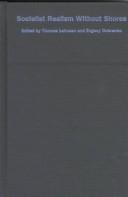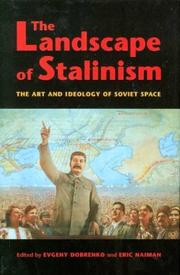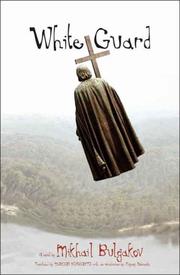| Listing 1 - 10 of 17 | << page >> |
Sort by
|
Book
ISBN: 3876905567 Year: 1993 Publisher: München : Sagner,
Abstract | Keywords | Export | Availability | Bookmark
 Loading...
Loading...Choose an application
- Reference Manager
- EndNote
- RefWorks (Direct export to RefWorks)

ISBN: 5265015124 Year: 1990 Publisher: Moskva Sovetskij pisatel'
Abstract | Keywords | Export | Availability | Bookmark
 Loading...
Loading...Choose an application
- Reference Manager
- EndNote
- RefWorks (Direct export to RefWorks)
Arts, Russian --- Socialist realism in art --- Russie --- Idéologie --- URSS --- Arts

ISBN: 0822319411 0822319357 0822398095 Year: 1997 Publisher: Durham, N.C. : Duke University Press,
Abstract | Keywords | Export | Availability | Bookmark
 Loading...
Loading...Choose an application
- Reference Manager
- EndNote
- RefWorks (Direct export to RefWorks)
Socialist Realism without Shores offers an international perspective on the aesthetics of socialist realism—an aesthetic that, contrary to expectations, survived the death of its originators and the demise of its original domain. This expanded edition of a special issue of the South Atlantic Quarterly brings together scholars from various parts of the globe to discuss socialist realism as it appears across genres in art, architecture, film, and literature and across geographic divides—from the "center," Russia, to various points at the "periphery"—China, Germany, France, Poland, remote republics of the former USSR, and the United States.The contributors here argue that socialist realism has never been a monolithic art form. Essays demonstrate, among other things, that its literature could accommodate psychoanalytic criticism; that its art and architecture could affect the aesthetic dictates of Moscow that made "Soviet" art paradoxically heterogeneous; and that its aesthetics could accommodate both high art and crafted kitsch. Socialist Realism without Shores also addresses the critical discourse provoked by socialist realism—Stalinist aesthetics, "anthropological" readings; ideology critique and censorship; and the sublimely ironic approaches adapted from sots art, the Soviet version of postmodernism.Contributors. Antoine Baudin, Svetlana Boym, Greg Castillo, Katerina Clark, Evgeny Dobrenko, Boris Groys, Hans Günther, Julia Hell, Leonid Heller, Mikhail Iampolski, Thomas Lahusen, Régine Robin, Yuri Slezkine, Lily Wiatrowski Phillips, Xudong Zhang, Sergei Zimovets
Realisme socialiste dans l'art --- Socialist realism in art --- Socialistische realisme in de kunst --- 7.067.2 --- 7.036 <47> --- Sociale betekenis van de kunst --- Moderne kunststijlen--Rusland --- Arts, Modern --- Socialist realism in art. --- 7.067.2 Sociale betekenis van de kunst --- Art and revolutions --- Communism and art --- Socialism and art --- Arts [Modern ] --- 20th century --- Soviet Union --- Communist countries
Book
ISBN: 9780521875356 9780521698047 0521875358 0521698049 1139801627 0511975805 9780511975806 Year: 2011 Volume: *163 Publisher: Cambridge Cambridge University Press
Abstract | Keywords | Export | Availability | Bookmark
 Loading...
Loading...Choose an application
- Reference Manager
- EndNote
- RefWorks (Direct export to RefWorks)
In Russian history, the twentieth century was an era of unprecedented, radical transformations - changes in social systems, political regimes, and economic structures. A number of distinctive literary schools emerged, each with their own voice, specific artistic character, and ideological background. As a single-volume compendium, the Companion provides a new perspective on Russian literary and cultural development, as it unifies both émigré literature and literature written in Russia. This volume concentrates on broad, complex, and diverse sources - from symbolism and revolutionary avant-garde writings to Stalinist, post-Stalinist, and post-Soviet prose, poetry, drama, and émigré literature, with forays into film, theatre, and literary policies, institutions and theories. The contributors present recent scholarship on historical and cultural contexts of twentieth-century literary development, and situate the most influential individual authors within these contexts, including Boris Pasternak, Alexander Solzhenitsyn, Joseph Brodsky, Osip Mandelstam, Mikhail Bulgakov and Anna Akhmatova.

ISBN: 0295983337 9780295983332 9780295801179 0295801174 0295983418 9780295983417 Year: 2003 Publisher: Seattle University of Washington Press
Abstract | Keywords | Export | Availability | Bookmark
 Loading...
Loading...Choose an application
- Reference Manager
- EndNote
- RefWorks (Direct export to RefWorks)
Communism and culture --- Socialist realism. --- Stalin, Joseph, --- Socialist realism --- Communisme et culture --- Réalisme socialiste --- Réalisme socialiste --- Realism, Socialist --- Communist aesthetics --- Djougatchvili, Iossif Vissarionovitch, --- Джугашвили, Иосиф Виссарионович, --- Dzhugashvili, Iosif Vissarionovich, --- Koba, --- Shih-tʻai-lin, --- Sidalin, --- Ssu-ta-lin, --- Stalin, Giuseppe, --- Сталин, И. В. --- Stalin, I. V. --- Сталин, Иосиф, --- Stalin, Iosif, --- Сталин, К., --- Stalin, K., --- Staline, --- Staline, Joseph, --- Staljin, J. V., --- Sutārin, --- Soselo, --- Stalini, Ioseb Besarionis że, --- Sṭalin, Y. Ṿ., --- Sṭalin, Y., --- Stalin, Josef, --- Stalin, Josef Vissarionovich, --- סטאלין, יאסיף, --- סטאלין, י. --- סטאלין, י. וו --- סטאלין, י. װ. --- סטאלין, י., --- סטלין, יוסיף ויסאריונוביץ׳, --- סטלין, יוסף --- 斯大林, --- Stalin, Jossif Vissarionovitš, --- Sztálin, Joszif, --- Istālīn, Yūsīf Vīsāryūnūvīch, --- استالين، يوسيف ويساريونووتج, --- Σταλιν, Ιωσηφ, --- Stalin, Ιōsēph, --- Jughashvili, Ioseb, --- Jughashvili, Ioseb Vissarionovich, --- Jughashvili, Koba,
Book
ISBN: 9781843313106 1843313103 9781843318170 9786613377838 1843318172 1283377837 Year: 2009 Publisher: London Anthem Press
Abstract | Keywords | Export | Availability | Bookmark
 Loading...
Loading...Choose an application
- Reference Manager
- EndNote
- RefWorks (Direct export to RefWorks)
Petrified Utopia redresses the lack of scholarship on the issue of the pursuit of collective happiness in Soviet culture, and presents a collection of essays that discuss different manifestations of happiness in literature and visual culture.
Communism and culture --- Group identity --- Happiness --- Identity (Psychology) --- Social values --- Utopias --- History --- Political aspects --- Social aspects --- Soviet Union --- Social life and customs --- Social conditions --- Intellectual life --- Collective identity --- Community identity --- Cultural identity --- Social identity --- Social psychology --- Collective memory --- Personal identity --- Personality --- Self --- Ego (Psychology) --- Individuality --- Values --- Culture and communism --- Culture --- Ideal states --- States, Ideal --- Utopian literature --- Political science --- Socialism --- Voyages, Imaginary --- Dystopias --- Gladness --- Emotions --- Cheerfulness --- Contentment --- Pleasure --- Well-being --- Советский Союз --- Ber. ha-M. --- Związek Socjalistycznych Republik Radzieckich --- ZSRR --- Związek Socjalistycznych Republik Sowieckich --- ZSRS --- Szovjetunió --- TSRS --- Tarybų Socialistinių Respublikų Sąjunga --- SRSR --- Soi︠u︡z Radi︠a︡nsʹkykh Sot︠s︡ialistychnykh Respublik --- SSSR --- Soi︠u︡z Sovetskikh Sot︠s︡ialisticheskikh Respublik --- UdSSR --- Shūravī --- Ittiḥād-i Jamāhīr-i Ishtirākīyah-i Shūrāʼīyah --- Russia (1923- U.S.S.R.) --- Sovetskiy Soyuz --- Soyuz SSR --- Sovetskiĭ Soi︠u︡z --- Soi︠u︡z SSR --- Uni Sovjet --- Union of Soviet Socialist Republics --- USSR --- SSṚM --- Sovetakan Sotsʻialistakan Ṛespublikaneri Miutʻyun --- SSHM --- Sovetakan Sotsʻialistakan Hanrapetutʻyunneri Miutʻyun --- URSS --- Unión de Repúblicas Socialistas Soviéticas --- Berit ha-Moʻatsot --- Rusyah --- Ittiḥād al-Sūfiyītī --- Rusiyah --- Rusland --- Soṿet-Rusland --- Uni Soviet --- Union soviétique --- Zȯvlȯlt Kholboot Uls --- Związek Radziecki --- ESSD --- Sahaphāp Sōwīat --- KhSHM --- SSR Kavširi --- Russland --- SNTL --- PSRS --- Su-lien --- Sobhieṭ Ẏuniẏana --- FSSR --- Unione Sovietica --- Ittiḥād-i Shūravī --- Soviyat Yūniyan --- Russian S.F.S.R.
Book
ISBN: 0822977443 9780822977445 0822944111 9780822944119 1306554691 9781306554695 9780822944119 0822962861 Year: 2011 Publisher: Pittsburgh, Pennsylvania
Abstract | Keywords | Export | Availability | Bookmark
 Loading...
Loading...Choose an application
- Reference Manager
- EndNote
- RefWorks (Direct export to RefWorks)
This volume assembles the work of leading international scholars in a comprehensive history of Russian literary theory and criticism from 1917 to the post-Soviet age. By examining the dynamics of literary criticism and theory in three arenas-political, intellectual, and institutional-the authors capture the progression and structure of Russian literary criticism and its changing function and discourse. The chapters follow early movements such as formalism, the Bakhtin Circle, Proletklut, futurism, the fellow-travelers, and the Russian Association of Proletarian Writers. By the cultural
Criticism --- Russian literature --- Evaluation of literature --- Literary criticism --- Literature --- Rhetoric --- Aesthetics --- History. --- History and criticism --- Theory, etc. --- History --- Technique --- Evaluation
Digital
ISBN: 9781843318170 Year: 2009 Publisher: London Anthem Press
Abstract | Keywords | Export | Availability | Bookmark
 Loading...
Loading...Choose an application
- Reference Manager
- EndNote
- RefWorks (Direct export to RefWorks)

ISBN: 1282088823 9786612088827 0300148194 9780300148190 9781282088825 9780300122428 030012242X 9780300151459 0300151454 9780897332460 0897332466 Year: 2008 Publisher: New Haven Yale University Press
Abstract | Keywords | Export | Availability | Bookmark
 Loading...
Loading...Choose an application
- Reference Manager
- EndNote
- RefWorks (Direct export to RefWorks)
White Guard, Mikhail Bulgakov's semi-autobiographical first novel, is the story of the Turbin family in Kiev in 1918. Alexei, Elena, and Nikolka Turbin have just lost their mother-their father had died years before-and find themselves plunged into the chaotic civil war that erupted in the Ukraine in the wake of the Russian Revolution. In the context of this family's personal loss and the social turmoil surrounding them, Bulgakov creates a brilliant picture of the existential crises brought about by the revolution and the loss of social, moral, and political certainties. He confronts the reader with the bewildering cruelty that ripped Russian life apart at the beginning of the last century as well as with the extraordinary ways in which the Turbins preserved their humanity. In this volume Marian Schwartz, a leading translator, offers the first complete and accurate translation of the definitive original text of Bulgakov's novel. She includes the famous dream sequence, omitted in previous translations, and beautifully solves the stylistic issues raised by Bulgakov's ornamental prose. Readers with an interest in Russian literature, culture, or history will welcome this superb translation of Bulgakov's important early work. This edition also contains an informative historical essay by Evgeny Dobrenko.
LITERARY CRITICISM / General. --- Ukraine --- An Úcráin --- I-Yukreyini --- IYukreyini --- Malorosii︠a︡ --- Małorosja --- Oekraïne --- Ookraan --- Oukraïne --- Oykrania --- Petite-Russie --- U.S.R.R. --- Ucrægna --- Úcráin --- Ucraina --- Ucrania --- Ucrayena --- ʻUkelena --- Ukraïna --- Ukrainæ --- Uḳraʼinah --- Ukrainian Council Socialist Republic --- Ukrainian S.S.R. --- Ukrainian Socialist Soviet Republic --- Ukrainian Soviet Socialist Republic --- Ukrainio --- Ukrainmudin Orn --- Ukraïnsʹka Radi︠a︡nsʹka Sot︠s︡ialistychna Respublika --- Ukrainska Radyanska Sotsialistychna Respublika --- Ukrainska Sotsialistychna Radianska Respublika --- Ukraïnsʹka Sot︠s︡ii︠a︡listychna Radi︠a︡nsʹka Respublika --- Ukrainskai︠a︡ Sovetskai︠a︡ Sot︠s︡ialisticheskai︠a︡ Respublika --- Ukrainskaya Sovetskaya Sotsialisticheskaya Respublika --- Ukrainujo --- Ukrajina --- Ūkrāniyā --- Ukranya --- Ukrayiina --- Ukrayina --- Ukrayna --- Ukuraina --- Ukyáña --- Wcráin --- Yn Ookraan --- Yr Wcráin --- Yukrain --- Ουκρανία --- Украинæ --- Украина --- Украинэ --- Украинмудин Орн --- Україна --- אוקראינע --- אוקראינה --- أوكرانيا --- ウクライナ --- 우크라이나 --- Ukraine (Hetmanate : 1648-1782) --- History --- Ukraine -- History -- Revolution, 1917-1921 -- Fiction. --- Historical fiction.
Book
ISBN: 1783086998 1783086971 Year: 2018 Publisher: London ; New York : Anthem Press,
Abstract | Keywords | Export | Availability | Bookmark
 Loading...
Loading...Choose an application
- Reference Manager
- EndNote
- RefWorks (Direct export to RefWorks)
"This volume brings together articles written by experts in the literary history of Central and Eastern European literatures. Focused on the export of Socialist Realism into Europe after WWII, the authors look not so much at similarities as at the particularities of each specific national and cultural context. The introduction of the Soviet cultural model was not quite the smooth endeavour that it was intended to be; rather, it was always a work in progress, often born out of a give-and-take with the local authorities, intellectuals and interest groups. Those in charge had to negotiate the precarious terrain of local cultural and political controversies, caught between tradition and innovation in some countries, or, in others, between a sincere interest in the new concept of art and a complete refusal to accept new rules. Paradoxically, among all the different experiences of introducing, importing imposing Socialist Realism in the specific national contexts, the one thing in common is that each case was a response to the local conditions, a process of working through the challenge of inscribing a staunch theory into the daily reality of an unfamiliar country, language and culture."-- "This collection on the export of Socialist Realism into Central and Eastern Europe after WWII is the first work on the subject which offers an in-depth analysis of the particularities of distinct national and cultural contexts and explores complexities of the cultural Sovietisation of the region"--
East European literature --- Socialist realism in literature. --- European literature --- History and criticism. --- Europe, Eastern --- East Europe --- Eastern Europe --- Intellectual life. --- Cultural policy. --- Politics and government
| Listing 1 - 10 of 17 | << page >> |
Sort by
|

 Search
Search Feedback
Feedback About UniCat
About UniCat  Help
Help News
News